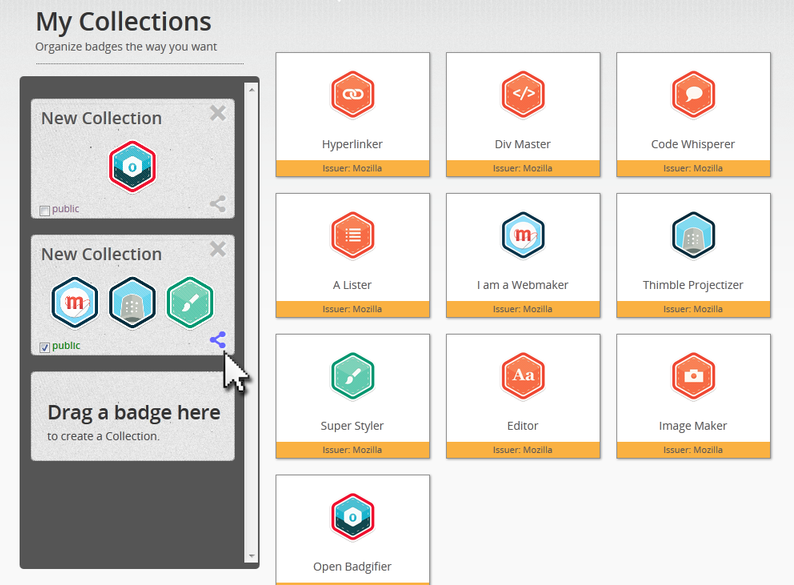By Stella Porto, Learning & Knowledge Management Specialist at INDES in the Inter-American Development Bank
There is an important shift happening in the job market. Organizations are faced with a huge burden to retrain workers, while professionals are seeking continuous development to remain relevant in an ever more competitive workforce.
For this segment of the population, learning needs are different. Thus, training programs and certifications must change accordingly. Such programs should provide the specialized credentials for new skills and competencies, which can be quickly recognized by prospective employers.
Digital badges are“a way to display talents ranging from the practical (proficiency in a computer program) to the academic (demonstrated competency in a subject area)”. The concept of badges has its origins on the patches earned by Boy and Girl Scouts. Those patches were symbols of achievement and mastery of certain skills. A digital badge is therefore a digital representation of a badge. Corporations have used badges to recognize competencies and achievements that are valuable to their business. More recently, Mozilla started a new project called “Open Badges”, which aims at making use of badges at a global and decentralized scale.
In this post, we explain what they are and how they can be adopted by education and training providers.
What exactly are Open Badges?
Strictly speaking, badges are visual digital representations to recognize skills and achievements acquired inside or outside the classroom.
The Mozilla Open Badges initiative provides a platform for displaying badges that can be easily adopted. It is open-source and therefore the software is free and its technical specifications are open.
Open badges are displayed as a digital symbol that can be posted on a website and, most importantly, are linked back to the issuer of the badge, the assessment criteria and the evidence of achievement. Users will also easily be able to display their badges using different social media channels such as LinkedIn, Facebook and personal blogs.
How do they work?
There are four major players in a badging ecosystem: earners, issuers, displayers and acceptors.
Earners are those who earn the badges. Issuers are the organizations who award the badges according to assessment standards. Displayers are the web-based platforms that display the digital badges on behalf of the earners, and finally the acceptors are individual and organizations who accept the badge as a proof or evidence of the achievement of that particular competency and /or skill.
The Open Badges project was initially developed as collaboration between MacArthur Foundation, HASTAC and Mozilla Foundation. Since its inception, it has grown through a large community of contributors, which include NASA, the Smithsonian and Intel.
Why are they so important?
Open Badges are important because they create bridges between employers, professionals and educational providers. They establish a common framework for recognizing skills and competencies. For organizations, open badges help identify quality professionals through recognized and substantiated skills and competencies. For individuals, open badges are a way to display such skills and competencies which the necessary credentialing, making them more visible in the job market.
When accepted and used by all parties, open badges become a major channel of communication, establishing common standards and common language that define and describe professional achievement. It is therefore of utter importance that all the players participate: educational providers issuing badges that attest adequate competencies achieved by the badge earners, who are then easily recognized by employers as prospective hires.
Who is using Open Badges?
The Open Badges website offers a long list of those using badges: organizations which are issuing badges and those designing badges. The list includes several educational institutions, such as University of Southern California, University of Illinois and UC Davis; as well as other organizations such as Disney-Pixar, Gogo Labs, and Microsoft.
An interesting example is Smithsonian Quests. This is a program that “connects and rewards learners of different regions as they learn through discovery and collaboration”. Students do online activities and receive incentives to continue through badges, which in many cases are “integrated with content from online education conferences”. The quests are aligned with school curriculum and are grade appropriate. Educators can also earn badges resulting from their participation in online conferences.
Another example is the project Whitecard, which develops simulation, training and educational software. Through agreements with NASA and the Mozilla Open Badge Infrastructure Project Whitecard has created the Starlite Digital Badges system that support the showcasing of scientific achievement.
The great asset of the Open Badges initiative is its open source trait. By enlarging the community of contributors, new sources are created and shared with all community members, expanding the outreach of the project and the recognition of badges created and issued under these standards.
Does your organization use Open Bagdes? Share your experience including a comment below!


Excellent project!!!